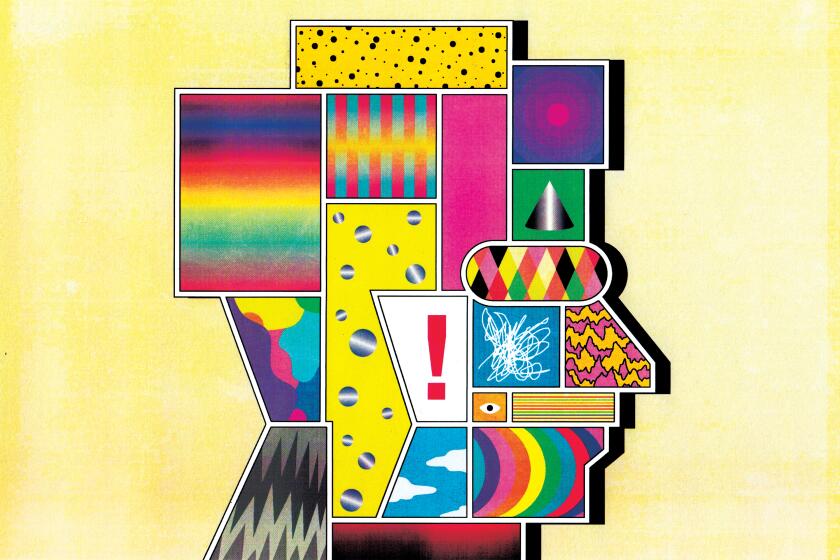How to help a friend after a breakup? Your first instinct is wrong

- Share via
It’s hard to know what to do or say when a loved one is in the throes of a devastating breakup. No matter what you try — talking about it, not talking about it, vilifying the ex, coming up with fun distractions — they remain consumed with grief. Is there a right way to ease the pain?
There is, according to experts. Although every heartbreak is different, a few basic strategies can help us avoid well-meaning pitfalls and provide thoughtful support to a loved one grieving the gut-wrenching loss of a partner. The key, therapists and academics say, is remembering that you can’t make the heartache disappear. What you can offer instead is empathy, validation and a place for your friend to share their feelings without judgment.
“If you can create a space to sit with their pain and let them know you are not going to try to fix it or change it, you are doing quite a lot right there,” said Tamala Black, a psychologist based in Culver City who specializes in trauma. “Everyone has their own pace for when they are ready to release that heartache and let go.”
Understanding heartbreak
Someone in the midst of a painful breakup is experiencing a number of losses all at once. Even if the relationship was toxic, even if your friend initiated the split, they may still be mourning the loss of their identity as part of a couple, the loss of a close friend and companion and the loss of an imagined future. They also may be cycling through regret, internalized shame and self-blame for the relationship ending.
From self-care treatments to intentional creative play, we selected solo activities that are a perfect starting point for breaking away from the norm.
“Love is a fundamental human need, and being in a long-term relationship can shape our reality by altering how we see ourselves and the world,” said Ron Rogge, an associate professor of psychology at the University of Rochester in New York. “When that relationship falls apart, it’s life-shattering. Your identity is fractured.”
A breakup also can lead to chemical changes in the body. Sex and heightened skin-to-skin contact cause us to release oxytocin, a hormone that is associated with feelings of calmness, security and joy. The experience of falling and being in love releases high levels of dopamine, a hormone that activates a reward circuit in the brain that leads to feelings of euphoria. When a person suddenly finds themselves broken up from a beloved partner, a steady stream of feel-good chemicals is abruptly cut off.
“It’s kind of like a withdrawal,” Black said. “It’s as if all this love, all this care, the physical touch, the outings — it doesn’t have a place to exist anymore.”
Avoiding pitfalls
Seeing a friend in this altered state can cause your own heart to break, but trying to immediately fix the problem won’t help. “You can’t heal someone’s pain by trying to reduce it,” Black said.
Science shows that heartbreak doesn’t just hurt emotionally. It can affect our brains and immune systems. I asked researchers if science could also mend my broken heart.
With that in mind, when a friend is reeling from a recent breakup, Rogge suggests refraining from giving advice unless that person specifically asks for it. “Remember that they’re in the midst of a hurricane of emotions and they don’t need to learn any lessons or make any decisions right now,” he said.
If your friend does ask for advice, you can offer your perspective. But choose your words carefully. “You want to share your thoughts and feelings in a gentle way,” Rogge said.
You may feel tempted to share stories of your own past breakups and how you got over them, but that can be counterproductive. “That’s really, really not helpful,” Black said. “It often causes the person to close up emotionally.”
And crucially, you should try to resist bashing the ex-partner in question. For those who feel protective of friends’ well-being, this can be incredibly difficult (especially if we never liked the ex in the first place). But Rogge says it’s worth the effort to hold back.
“It’s a dangerous thing to do,” Rogge said. “They often still love that person and see that person as a part of themselves they are grieving. And there’s always the risk that they will get back together.”
Experts say that compartmentalizing can be a healthy and essential tool to help us get through the day.
If they do get back together after you’ve trashed their ex, your friend may feel they can no longer trust you, he said.
Bad-mouthing a friend’s former partner usually won’t have the effect you hoped for anyway. Many people romanticize their ex at the end of a relationship and long to reconnect with their fantasy of that person, Black said. Disparaging a friend’s ex might paradoxically cause your friend to feel defensive of them, making it harder for them to let go.
Showing up
So what can a caring friend do to support a loved one in the midst of a heartbreak? The answer is deceptively simple: Show up and leave your expectations at the door.
“A good friend will reach out and let the person know you are not afraid of their sadness,” said Becky White, founder and chief executive of Root to Rise Therapy in L.A. “It’s letting them know, ‘I don’t need you to be happy or positive. I’m here for you and I’m not going to hide or be scared off.’”
It can be hard to create new routines, but treating yourself to a nice cup of coffee, tea or juice can serve as great motivation to keep a walking habit on track.
Rogge suggests letting your friend talk as long as they like, listening with an open heart and validating their emotions. ”Letting them know it makes sense to hurt like this is very helpful,” he said. “It validates their feelings and gives them permission to accept those feelings, experience them and allow them to begin to pass.”
As far as activities that might provide that kind of comfort, there’s plenty you can do beyond watching rom-coms on the couch with Häagen-Dazs in hand. You might also offer to accompany them on outings they used to share with their partner, like grocery shopping or grabbing breakfast on a Saturday morning, Rogge said. “That can mean a lot as they are putting their life back together — just knowing they don’t have to do this all by themselves.”
Be aware of situations that might be triggering; the smell of a certain perfume or cologne, a favorite song or seeing a TV show they watched with their ex can cause someone to spiral. If your friend has to go to a place where they might run into their ex — a child’s school concert or a religious service — you can offer to go with them as support. It’s OK for them to avoid those places for a few weeks after a breakup, but they shouldn’t abandon them altogether. “Be careful of too much change all at once,” Black said. “You don’t want them to detach from their normal ways of navigating life.”
Anticipating the moments that they might feel especially lonesome can go a long way. For example: reaching out on Valentine’s Day or Christmas — holidays they used to spend with their partner.
I met a wonderful, kind and handsome Marine via a dating app. I wanted to spend my life with him. But our relationship suddenly changed.
“Asking them to call us and letting us know what they need puts another burden on them,” Black said. “What we want to do is recognize what they need.”
Though no one recovers from grief overnight, pay attention to the amount of time a friend is in a dark place. If it’s been more than six months, or if you notice they are withdrawing, neglecting responsibilities or abusing substances, you might suggest they find a mental health professional to talk to, and offer them help in finding one.
“We never want to diagnose our friends, but grieving or sadness that results in isolation, withdrawing — if they aren’t eating or stop answering phone calls for a long duration of time — that’s more than sadness, that’s depression,” Black said.
And finally, remember that judgment only adds salt to the wound.
“Whether the relationship was healthy, whether they were ready to separate or not, that person is really trying to grapple with what does it feel like to be an individual again,” Black said. “No heartbreak is greater than another.”
More to Read
Sign up for The Wild
We’ll help you find the best places to hike, bike and run, as well as the perfect silent spots for meditation and yoga.
You may occasionally receive promotional content from the Los Angeles Times.
















